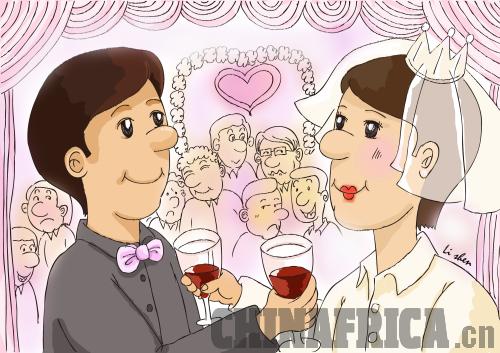|

For cultural and traditional reasons, homosexuality is hardly a prominent issue in Chinese society. However, as a phenomenon, homosexuality has a long history in human society, and the population of gay people is not negligible. On October 2, 2012, a special wedding in southeast China's Fujian Province provoked a firestorm of debate on the legalization of gay and lesbian marriage. The cause of all this controversy is the gay couple, Lu Zhong, 24, and Liu Wanqiang, 20, who committed themselves to each other in a public wedding ceremony.
Official estimates released for the first time in 2004 put the number of gay men in China at between 5 and 10 million. But more recent studies by Zhang Beichuan, an expert studying HIV and LGBT (lesbian, gay, bisexual and transgender) issues at Qingdao University, indicate that the number of gay and lesbian people in the Chinese mainland could be as high as 30 million.
The public has differing opinions on the legalization of same-sex marriage. Supporters say that as long as two people love each other, they should be able to marry. And because sexual orientation is not chosen, gay people are entitled to the same rights enjoyed by other people and shouldn't be denied the right to marry their lovers. However, opponents maintain that same-sex marriage is against tradition, and that legal recognition of gay and lesbian marriage will lead to unpredictable consequences.
FOR
Tao Ting
Company employee
Legalizing same-sex marriage will benefit not only homosexuals, but also others and society as a whole.
Physiologically, homosexuality is neither a disorder nor a disease, but rather a normal variant of sexual orientation. A person's sexual orientation never compromises the social roles they play. Gay people can be trusted and have outstanding capabilities. In fact, it is said that many highly respected individuals of ancient and modern times were gay, including artists and thinkers such as Plato, Michelangelo, Leonardo Da Vinci and others.
The legalization of same-sex marriage would undoubtedly be good news for gay people. They would be able to be more reasonable and open in the pursuit of their happiness. Moreover, not only gay people's legitimate rights would be protected by such legislation, it would also keep gay or lesbian people from resorting to extreme means in their fight for social recognition.
Zhang Yawen
Rednet.cn
Same-sex marriage has been legally recognized by Switzerland, Belgium, Canada, the Netherlands, Spain and some other countries. Nowadays, more and more countries are on the way to legalizing such marriages.
Many gay people are gentle, kindhearted, passionate, honest, well-mannered, loyal to their country, and filial to their family and parents. Some are even pillars of the society. But just because of their sexual orientation, they are treated with prejudice and discrimination, and have to live in darkness with fewer dignities.
A person's particular sexual orientation never means that they are indecent or immoral. We should not force everybody to accept one uniform mindset or pursue "cultural hegemony," but accept homosexuals with tolerant and rational attitude.
Li Yinhe
Sexologist and activist for LGBT rights
Legally acknowledging same-sex marriage will only benefit society, and will not harm it in any way.
First of all, being gay is not against Chinese law, and gay people have the same rights as every other Chinese citizen. Their right to marry should also be acknowledged.
Second, Chinese culture tends to show more tolerance toward homosexuality. The nation should make use of this advantageous situation and use it as a firm proof on its commitment to protecting human rights.
Third, the legalization of same-sex marriage will normalize and stabilize sexual relationships between homosexuals, helping reduce the spread of venereal diseases.
Fourth, China has gained successful experiences in protecting the interests of minority and other vulnerable groups, such as ethnic minorities, women and children. Protecting homosexuals, who qualify as both a minority group and a vulnerable one, will improve the nation's international image and create a more open, tolerant and harmonious social atmosphere.
|